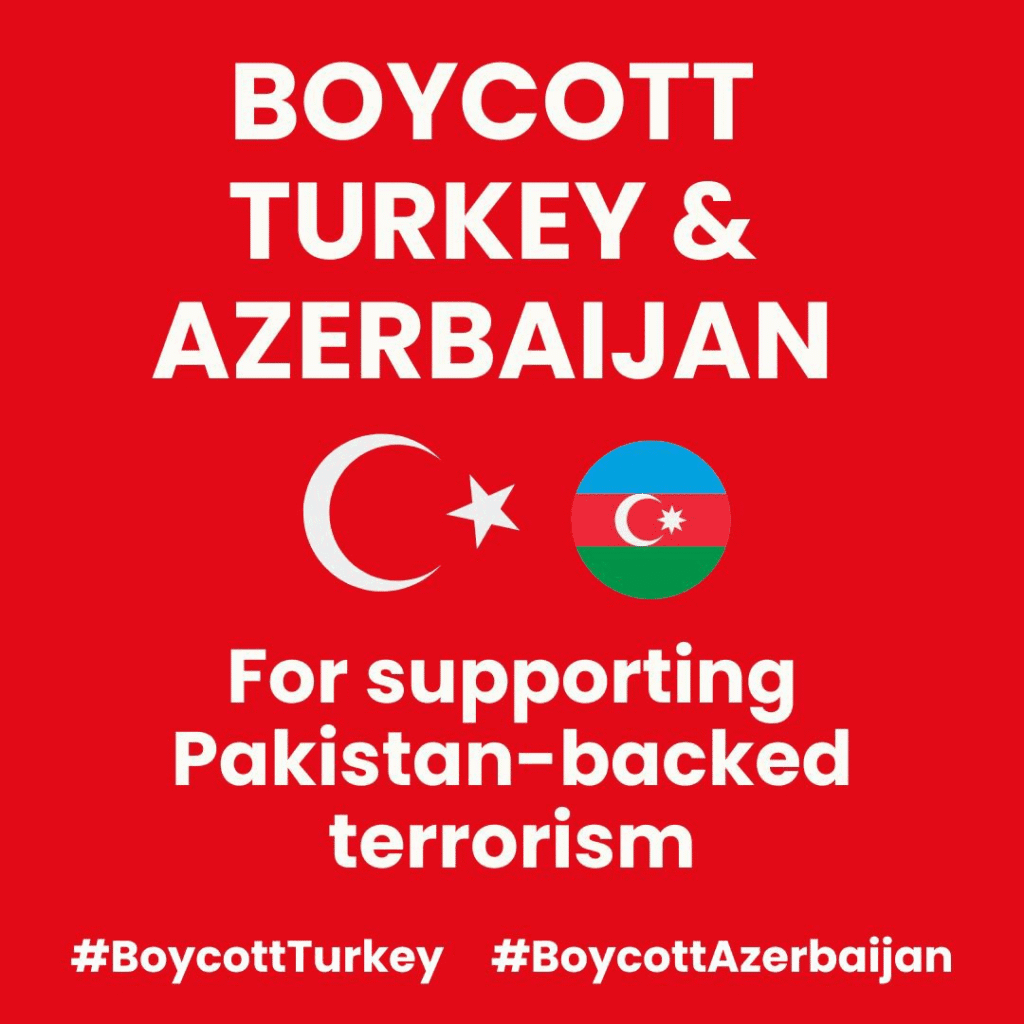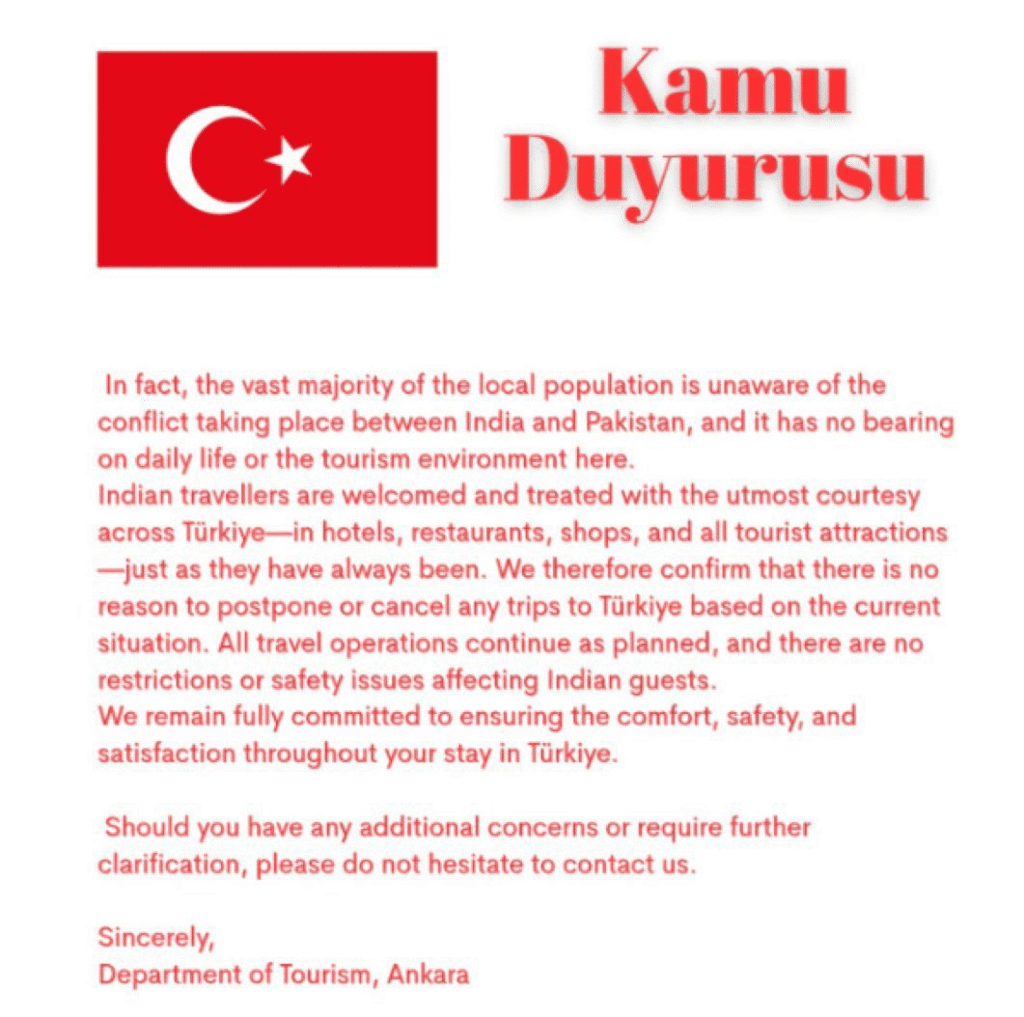
In recent days, social media platforms in India have seen the rise of a powerful trend: #BoycottTurkey. From Twitter (now X) to Instagram, users across the country have voiced their displeasure over Turkey’s recent stance on the ongoing India-Pakistan conflict. This article explains the reasons behind the boycott call, the public and celebrity response, and the broader implications on trade and tourism.
Background: What Sparked the #BoycottTurkey Trend?
The hashtag gained momentum following statements made by Turkey’s Foreign Minister Hakan Fidan in response to India’s recent Operation Sindoor—a military operation aimed at neutralizing terror camps in Pakistan-occupied Kashmir (PoK). The operation was launched after a terror attack in Pahalgam (J&K), which resulted in the tragic death of several Indian soldiers.
Instead of condemning terrorism, Turkey expressed support for Pakistan, terming India’s counter-terror operation as “provocative” and urging restraint. This perceived pro-Pakistan stance deeply offended many Indians, prompting calls for a diplomatic and economic boycott of Turkey.
Public Reaction: A Wave of National Sentiment
Indians responded swiftly to Turkey’s remarks with the hashtag #BoycottTurkey going viral across platforms. Many citizens viewed Turkey’s response as a betrayal, especially considering India’s humanitarian aid during the 2023 Turkey earthquake.
Social Media Outcry
- Netizens called for canceling travel plans to Turkey, boycotting Turkish goods, and promoting Indian alternatives.
- Videos and images of users uninstalling Turkish apps or removing Turkish products from their shelves circulated widely.
Celebrities Join the Call
Several Indian celebrities lent their voices to the movement:
- Rupali Ganguly, television actress known for Anupamaa, tweeted urging Indian citizens and celebrities to cancel their Turkey trips, saying:
“Tourism and terrorism cannot go hand in hand. Boycott Turkey.” - Actor Kushal Tandon revealed that his mother canceled a planned vacation to Turkey despite financial losses, prioritizing national interest over personal convenience.
These public endorsements further fueled the trend, encouraging fans and followers to rethink their travel plans and spending decisions.
Economic Impact: Travel, Trade & Tourism Take a Hit
The boycott sentiment quickly moved from social media to real-world consequences:
1. Tourism Sector Affected
- Travel companies like EaseMyTrip and Cox & Kings suspended tour packages to Turkey.
- Indian tourists—a significant market for Turkish tourism—began canceling their trips, especially during the upcoming summer holiday season.
2. Turkish Imports Face Resistance
- Traders in Pune and other parts of India refused to buy Turkish apples, switching instead to domestic and alternative foreign sources.
- Social media influencers encouraged boycotting Turkish products such as olive oil, dried fruits, ceramics, and textiles.
Political Responses
Several political figures voiced their support for the boycott:
- Congress leader Kuldeep Singh Rathore demanded an immediate ban on imports from Turkey and criticized Ankara for siding with Pakistan.
- Many reminded that India had generously provided aid to Turkey during the 2023 earthquake, making Turkey’s current stance particularly hurtful.
Turkey Responds: Attempts to Control Damage

In response to the backlash, Turkey’s Department of Tourism issued a statement assuring Indian tourists of their safety and welcome. The statement emphasized that tourism should remain unaffected by diplomatic differences and that “Turkey remains a safe and friendly destination for Indian travelers.”
However, the statement did little to pacify the anger of the Indian public, as most viewed it as a superficial PR effort without any change in political stance.
Conclusion: National Sentiment Over Profit
The #BoycottTurkey movement is not just a social media trend—it reflects the growing public consciousness around international diplomacy, national interest, and consumer power. Indians today are more informed, more connected, and more willing to take action when national pride is at stake.
As geopolitical tensions continue, citizens are using their voice—and their wallets—to send a strong message: national interest comes first.

